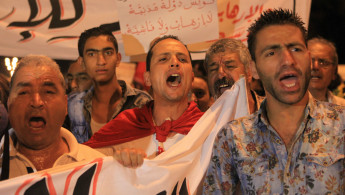Armed police patrol Tunisia resorts in wake of attack
Tunisia's top security official says 1,000 extra police are being deployed at tourist sites and beaches in the country.
Interior Minister Mohamed Najem Gharsalli made the announcement late Saturday. He said "we don't want to make tourist establishments into barracks, that's not our goal. But we must act to guarantee the security of the tourist sector."
| Tourists don't want to come and lie on a beach with guys with AK-47s |
Earlier, Tunisia's tourism minister called Friday's attack in one of the country's most popular resorts a "catastrophe".
Since its 2011 uprising that overthrew dictator Zine El-Abidine Ben Ali, Tunisia has been admired for its peaceful transition to democracy with a new constitution and free elections seen as a model for the region.
But its young democracy has also been tested by the rise of hardline Islamist movements, some of which have turned to violence. The army has been fighting a campaign against pockets of Islamist militants near the Algerian border.
And the new measures to increase the numbers of troops on the streets and crack down on organisations with radical links, however, won't bring the tourists back in the short-term, further threatening the fragile economy.
When a 24-year-old Master's student at Kairouan University strolled on to the Sousse beach and pulled out a Kalashnikov assault rifle and grenades hidden inside his beach umbrella, he was sounding the death knell for Tunisia's 2015 tourist season.
Tunisian authorities named the gunman as Saif Rezgui, a student who they say was not known to them.
Dressed in shorts and T-shirt, Rezgui opened fire on the beach of the Imperial Marhaba hotel on Friday, killing 38 people, 15 of them British, as well as German, Irish, Belgian and Portuguese victims, and sent thousands of tourists fleeing to airports.
"It's the first time I've ever been on holiday and feared for my life," said British tourist Matthew Preece, adding it was his third time visiting Tunisia and likely his last. "So obviously you can't come back somewhere it's not safe."
Tourists and employees are returning home with tales of horror cowering in rooms or offices as the killer stalked through the hotel wearing shorts.
European countries and tour operators sent planes to evacuate their citizens. By midday Saturday, nine flights had whisked away 1,400 people, according to Mohammed Walid Ben Ghachem, manager of the Enfidha-Hammamet Airport near Sousse.
At the Imperial Marhaba Hotel itself, the guests had left, according to manager Mohammed Becheur.
"We may have zero clients today, but we will keep our staff," he said, lamenting the 75-percent occupancy rate the day before. "This summer will be hard, but we are very confident for the long term."
Armed men on the beach may well become a more common sight in Tunisia, as Prime Minister Habib Essid announced a raft of new security measures that many have questioned why they weren't implemented after the last attack in March at the National Bardo Museum that killed 22.
"It's clear that the government's security policy requires a massive revision, in the sense that most of the tourist sites weren't well-protected," Tunisian security analyst Alaya Allani said. "If the measures announced are well implemented, we could reduce but not eradicate terrorism."
Essid called up the army reserves and said there would now be armed men in the hotels and at tourists sites and he also promised to crack down on unregulated mosques that preached extremist ideas and close down organisations with shadowy funding and extremist links.
North Africa analyst Geoff Porter noted that in the short term, these measures will only drive the extremists underground and create a militarised feel to the country that might well discourage tourism.
"Tunisia's in a difficult position, you can harden a tourist site and make it more difficult to attack but the same measures would deter tourists," he said. "Tourists don't want to come and lie on a beach with guys with AK-47s."
And Tunisia needs these tourists, especially in the coastal resort areas like Sousse where it is the dominant industry. Tourist made up nearly 15 percent of gross domestic product in 2014 and it has been struggling to recover after the shocks of the Arab Spring revolution.
The attack was claimed by Islamic State group, which thousands of Tunisians, disaffected with the lack of opportunity in the wake of the 2011 overthrow of secular President Zine El Abidine Ben Ali, have joined.
The attack came the same day that a suicide bomber killed 26 people in an attack on a Shia mosque in Kuwait, and a man in France ran his truck into a warehouse and hung his employer's severed head on the gate.
The attack in Kuwait was also claimed by the Islamic State and on Saturday thousands of people took part in a mass funeral procession. Police said they are interrogating a number of suspects with possible links to the bombing, which was claimed by an affiliate of the Islamic State group.
Extremists have increasingly attacked soldiers and politicians in Tunisia over the past few years, but it was only with the March museum attack that it began targeting the tourism life blood of the country that will only deepen its economic crisis.
It all may hinge, however, on whether the government can put an end to these attacks, which senior security official Rafik Chelli called an "isolated incident" that is difficult to guard against and could happen anywhere.
"If this attack doesn't do it, any subsequent attack will," Porter said. "It is hard to envision Tunisian tourism recovering from this attack and impossible to envision it recovering from a third one."





 Follow the Middle East's top stories in English at The New Arab on Google News
Follow the Middle East's top stories in English at The New Arab on Google News
![Israeli forces ordered bombed Gaza's Jabalia, ordering residents to leave [Getty]](/sites/default/files/styles/image_330x185/public/2176418030.jpeg?h=a5f2f23a&itok=_YGZaP1z)

